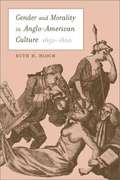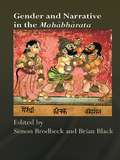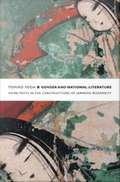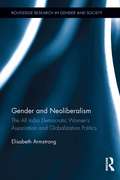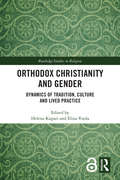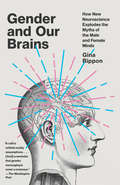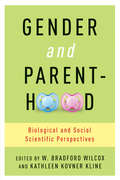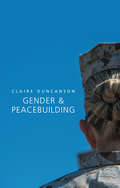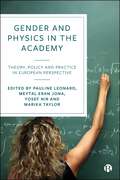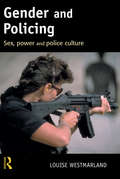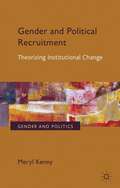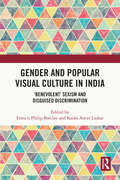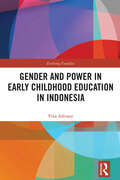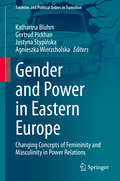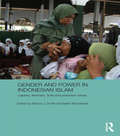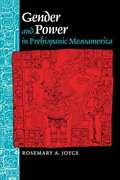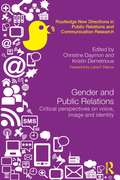- Table View
- List View
Gender and Morality in Anglo-American Culture, 1650-1800
by Ruth H. BlochA collection of new and previously published essays about the 18th-century formation of attitudes toward gender and family relations.
Gender and Narrative in the Mahabharata (Routledge Hindu Studies Series)
by Simon Brodbeck Brian BlackThe Sanskrit Mahabharata is one of the most important texts to emerge from the Indian cultural tradition. At almost 75,000 verses it is the longest poem in the world, and throughout Indian history it has been hugely influential in shaping gender and social norms. In the context of ancient India, it is the definitive cultural narrative in the construction of masculine, feminine and alternative gender roles. This book brings together many of the most respected scholars in the field of Mahabharata studies, as well as some of its most promising young scholars. By focusing specifically on gender constructions, some of the most innovative aspects of the Mahabharata are highlighted. Whilst taking account of feminist scholarship, the contributors see the Mahabharata as providing an opportunity to frame discussion of gender in literature not just in terms of the socio-historical roles of men and women. Instead they analyze the text in terms of the wider poetic and philosophical possibilities thrown up by the semiotics of gendering. Consequently, the book bridges a gap in text-critical methodology between the traditional philological approach and more recent trends in gender and literary theory. Gender and Narrative in the Mahabharata will be appreciated by readers interested in South Asian studies, Hinduism, religious studies and gender studies.
Gender and National Literature: Heian Texts in the Constructions of Japanese Modernity
by Tomiko YodaBoldly challenging traditional understandings of Heian literature, Tomiko Yoda reveals the connections between gender, nationalism, and cultural representation evident in prevailing interpretations of classic Heian texts. Renowned for the wealth and sophistication of women's writing, the literature of the Heian period (794-1192) has long been considered central to the Japanese literary canon and Japanese national identity. Yoda historicizes claims about the inherent femininity of this literature by revisiting key moments in the history of Japanese literary scholarship from the eighteenth century to the present. She argues that by foregrounding women's voices in Heian literature, the discipline has repeatedly enacted the problematic modernizing gesture in which the "feminine" is recognized, canceled, and then contained within a national framework articulated in masculine terms. Moving back and forth between a critique of modern discourses on Heian literature and close analyses of the Heian texts themselves, Yoda sheds light on some of the most persistent interpretive models underwriting Japanese literary studies, particularly the modern paradigm of a masculine national subject. She proposes new directions for disciplinary critique and suggests that historicized understandings of premodern texts offer significant insights into contemporary feminist theories of subjectivity and agency.
Gender and Neoliberalism: The All India Democratic Women’s Association and Globalization Politics (Routledge Research in Gender and Society)
by Elisabeth ArmstrongThis book describes the changing landscape of women’s politics for equality and liberation during the rise of neoliberalism in India. Between 1991 and 2006, the doctrine of liberalization guided Indian politics and economic policy. These neoliberal measures vastly reduced poverty alleviation schemes, price supports for poor farmers, and opened India’s economy to the unpredictability of global financial fluctuations. During this same period, the All India Democratic Women’s Association, which directly opposed the ascendance of neoliberal economics and policies, as well as the simultaneous rise of violent casteism and anti-Muslim communalism, grew from roughly three million members to over ten million. Beginning in the late 1980s, AIDWA turned its attention to women’s lives in rural India. Using a method that began with activist research, the organization developed a sectoral analysis of groups of women who were hardest hit in the new neoliberal order, including Muslim women, and Dalit (oppressed caste) women. AIDWA developed what leaders called inter-sectoral organizing, that centered the demands of the most vulnerable women into the heart of its campaigns and its ideology for social change. Through long-term ethnographic research, predominantly in the northern state of Haryana and the southern state of Tamil Nadu, this book shows how a socialist women’s organization built its oppositional strength by organizing the women most marginalized by neoliberal policies and economics.
Gender and Orthodox Christianity: Dynamics of Tradition, Culture and Lived Practice (Routledge Studies in Religion)
by Elina Vuola Helena KupariThe Orthodox Christian tradition has all too often been sidelined in conversations around contemporary religion. Despite being distinct from Protestantism and Catholicism in both theology and practice, it remains an underused setting for academic inquiry into current lived religious practice. This collection, therefore, seeks to redress this imbalance by investigating modern manifestations of Orthodox Christianity through an explicitly gender-sensitive gaze. By addressing attitudes to gender in this context, it fills major gaps in the literature on both religion and gender. Starting with the traditional teachings and discourses around gender in the Orthodox Church, the book moves on to demonstrate the diversity of responses to those narratives that can be found among Orthodox populations in Europe and North America. Using case studies from several countries, with both large and small Orthodox populations, contributors use an interdisciplinary approach to address how gender and religion interact in contexts such as, iconography, conversion, social activism and ecumenical relations, among others. From Greece and Russia to Finland and the USA, this volume sheds new light on the myriad ways in which gender is manifested, performed, and engaged within contemporary Orthodoxy. Furthermore, it also demonstrates that employing the analytical lens of gender enables new insights into Orthodox Christianity as a lived tradition. It will, therefore, be of great interest to scholars of both Religious Studies and Gender Studies.
Gender and Our Brains: How New Neuroscience Explodes the Myths of the Male and Female Minds
by Gina RipponA breakthrough work in neuroscience and an incisive corrective to a long history of damaging pseudo-science, finally debunking the myth that there is a biological distinction between male and female brains. For decades if not centuries, science has backed up society’s simple dictum that men and women are hardwired differently, that the world is divided by two different kinds of brains—male and female. However, new research in neuroimaging suggests that this is little more than “neurotrash.” In this powerfully argued work, acclaimed professor of neuroimaging, Gina Rippon, finally challenges this damaging myth by showing how the science community has engendered bias and stereotype by rewarding studies that show difference rather than sameness. Drawing on cutting edge research in neuroscience and psychology, Rippon presents the latest evidence which finally proves that brains are like mosaics comprised of both male and female components, and that they remain plastic, adapting throughout the course of a person’s life. Discernable gender identities, she asserts, are shaped by society where scientific misconceptions continue to be wielded and perpetuated to the detriment of our children, our own lives, and our culture.
Gender and Parenthood: Biological and Social Scientific Perspectives
by W. Bradford Wilcox Kathleen Kovner KlineThe essays in this collection deploy biological and social scientific perspectives to evaluate the transformative experience of parenthood for today's women and men. They map the similar and distinct roles mothers and fathers play in their children's lives and measure the effect of gendered parenting on child well-being, work and family arrangements, and the quality of couples' relationships. Contributors describe what happens to brains and bodies when women become mothers and men become fathers; whether the stakes are the same or different for each sex; why, across history and cultures, women are typically more involved in childcare than men; why some fathers are strongly present in their children's lives while others are not; and how the various commitments men and women make to parenting shape their approaches to paid work and romantic relationships. Considering recent changes in men's and women's familial duties, the growing number of single-parent families, and the impassioned tenor of same-sex marriage debates, this book adds sound scientific and theoretical insight to these issues, constituting a standout resource for those interested in the causes and consequences of contemporary gendered parenthood.
Gender and Peacebuilding
by Claire DuncansonGender and Peacebuilding offers a comprehensive and up to date analysis of how and why gender matters in contemporary peace operations. It draws on a wide range of examples from across the world to offer a nuanced account of the UN?s attempts to mainstream gender into peace operations via Security Council Resolution 1325, and assesses the successes and failures of this effort to enhance the participation and protection of women and girls in peacebuilding operations. In presenting this mixed picture of progress and ongoing challenges, the book argues for bold steps forward that will enable peacebuilding to contest the current neoliberal order, address structural inequalities, and bring about feminist visions of peace and security. It is only by focusing attention on the economic empowerment of women and its ability to temper the dangers of neo-liberalism in post-conflict contexts that feminists can hope to achieve these aims. Timely, critical and engaged, this book provides an invaluable guide to the issues for students of peace and conflict studies, and sets the agenda for future scholarship and advocacy.
Gender and Physical Education: Contemporary Issues and Future Directions
by Dawn PenneyGender and Physical Education offers a critical and comprehensive commentary on issues relating to gender in PE and teacher education. The book challenges our understandings of gender, equity and identity in PE, establishing a conceptual and historical foundation for the issue, as well as presenting a wealth of original research material. The book delivers a critical analysis of the progress and shortcomings pf contemporary policies and practice in PE as they relate to gender, and reflects on the similarities and differences between developments in the UK, US and Australia. It also offers a new framework for research, policy and practice with a view to advancing gender equity, and addresses the roles that teachers, educators and policy makers can play in challenging existing inequalities. Gender and Physical Education is important reading for students and lecturers in education, teacher educators and providers of continuing professional development in PE, and anybody concerned with gender issues in education, PE or sport.
Gender and Physics in the Academy: Theory, Policy and Practice in European Perspective
by Pauline Leonard, Meytal Eran Jona, Yosef Nir, and Marika TaylorThis innovative interdisciplinary collection confronts the worldwide challenge of women's under-representation in science through an interrogation of the field of physics and its gender imbalance. Leading physicists and sociologists from across Europe collaborate to adopt a comparative approach. They draw on theoretical perspectives and empirical evidence to explore the reasons behind low participation levels, from entering the field to sustaining a career, emphasising the importance of social perspectives over biological explanations. Evaluating policy solutions implemented in various European contexts, this book offers key insights into the world of women physicists and sheds light on their life stories.
Gender and Policing
by Louise WestmarlandGender and Policing is an innovative study of the real world of street policing and the gender issues which are a central part of this. Derived from extensive ethnographic research (involving police responses to gangland shootings, high speed car chases as well as more routine policing activities), this book examines the way police attitudes and beliefs combine to perpetuate a working culture which is dependent upon traditional conceptions of 'male' and 'female'. In doing so it challenges previously held assumptions about the way women are harassed, manipulated and constrained, focusing rather on the more subtle impact of structures and norms within police culture. Gender and Policing will be of interest to all those concerned with questions of policing and gender, and occupational culture more generally, while the theoretical framework developed will provide an important foundation for strategies of reform. At the same time the book provides a vivid and richly textured picture of the realities of operational policing in contemporary Britain.
Gender and Political Recruitment
by Meryl KennyThis book explores the gendered dynamics of institutional innovation, continuity and change in candidate selection and recruitment. Drawing on the insights of feminist institutionalism, it extends the 'supply and demand model' of political recruitment via a micro-level case study of the candidate selection process in post-devolution Scotland.
Gender and Political Violence: Women Changing The Politics Of Terrorism
by Candice D. Ortbals Lori M. Poloni-StaudingerThis book examines the role of gender in political conflicts worldwide, specifically the intersection between gender and terrorism. Political violence has historically been viewed as a male domain with men considered the perpetrators of violence and power, and women as victims without power. Whereas men and masculinity are associated with war and aggression, women and femininity conjure up socially constructed images of passivity and peace. This distinction of men as aggressors and women as passive victims denies women their voice and agency. This book investigates how women cope with and influence violent politics, and is both a descriptive and analytical attempt to describe in what ways women are present or absent in political contexts involving political violence, and how they deal with gender assumptions, express gender identities, and frame their actions regarding political violence encountered in their lives. The book looks to reach beyond the notion of women as victims of terrorism or genocide without agency, and to recognize the gendered nature of political conflicts and how women respond to violence. This book will be of interest to advanced undergraduate and graduate students in political science, sociology, cultural studies, and gender studies, academics in terrorism studies and gender studies, government officials, NGOs, and professionals working in areas of violent conflict.
Gender and Politics in Post-Reformasi Indonesia: Women Leaders within Local Oligarchy Networks
by Kurniawati Hastuti DewiThis book employs a gendered perspective to uncover an in-depth understanding of the political role of women leaders in local government in Indonesia. Beginning with the story of two women who successfully won the local elections in Indramayu in 2010 and Tangerang Selatan in 2011, respectively, the book uses their experiences as a point of departure to present a discussion on female political leaders’ part within the larger political dynastic structure in Indonesia. The book explores the multiple challenges and difficulties that these women encountered in reaching power and in promoting local democracy, highlighting the patriarchal nature of the oligarchy. In doing so, this book provides a rich empirical account of the current features of female political leaders and their political and familial, linkages. The research, thus, contributes significantly to the work of scholars and political activists seeking to unpack the process and progress of democratization in post-reformasi Indonesia, in which women’s political participation and leadership are an inevitable and vital part. In doing so, the book champions how Indonesian women are playing an increasingly important role in the democratic process, even in the face of the enduring challenges posed by familial ties and political dynasty factors that continue to hinder democratization—trends that are also prevalent across multiple Southeast Asian countries in the twenty-first century. Relevant to scholars and students situated at the intersection of gender and politics, this translated and updated co-publication is a tour de force, led by one of Indonesia’s seminal scholars in women’s studies.
Gender and Pop Culture: A Text-reader (second Edition) (Teaching Gender Ser. #11)
by Adrienne Trier-BieniekGender and Pop Culture provides a foundation for the study of gender, pop culture, and media. This newly updated edition is comprehensive and interdisciplinary, providing both text-book style introductory and concluding chapters written by the editor. The text includes eight original contributor chapters on key topics and is written in a variety of writing styles, discussion questions, additional resources, and more. Coverage includes: Foundations for studying gender and pop culture (history, theory, methods, key concepts); Contributor chapters on social media, technology, advertising, music, television, film, and sports; Ideas for activism and putting this book to use beyond the classroom; Pedagogical features; Suggestions for further readings on topics covered and international studies of gender and pop culture. Gender and Pop Culture was designed with students in mind, to promote reflection and lively discussion. With features found in both textbooks and anthologies, this sleek book can serve as a primary or supplemental reading in courses across disciplines.
Gender and Popular Culture (Critical Concepts In Media And Cultural Studies)
by Katie Milestone Anneke MeyerThis fully updated second edition of Gender and Popular Culture examines the role of popular culture in the construction of gendered identities in contemporary society. It draws on a wide range of cultural forms – including popular music, social media, television and magazines – to illustrate how femininity and masculinity are produced, represented, used and consumed. Blending primary and secondary research, Milestone and Meyer introduce key theories and concepts in gender studies and popular culture, which are made accessible and interesting through their application to topical examples such as the #MeToo campaign, intensive mothering and social media, discourses about women and binge drinking, and gender and popular music. Included in this revised edition is a new chapter on digital culture, examining the connection between digital platforms and gender identities, relations and activism, as well as a new chapter on cultural work in digital contexts. All chapters have been updated to acknowledge recent changes in gender images and relations as well as media culture. Additionally, there is new material on the Fourth Wave Women's Movement, audiences and prosumers, and the role of social media. Gender and Popular Culture is the go-to textbook for students of gender studies, media and communication, and popular culture.
Gender and Popular Visual Culture in India: ‘Benevolent’ Sexism and Disguised Discrimination
by Francis Philip Barclay Kaifia Ancer LaskarPerhaps, male-mindedness seems to have adapted to changing-contemporary circumstances to become more covert and conspiratorial. Sexist suggestions—through objectification and substantiated subordination—for instance, may have been explicit in Indian media a decade earlier. But in the contemporary times of online social media and vociferous feminism, such openness of unfairness against women in the media will, more often than not, be met with strife and unpalatable backlash—fearing which blatant prejudice is prudently steered clear of. It is, hence, understandable that patriarchy, to sustain itself as a culture, has adapted to become more benevolent in an increasingly hostile environment. To identify such sly and stealthy sexism embedded in media content, one may need a reconfigured grasp of contemporary feminist issues and an altered nuance for isolation and identification of discriminatory depictions. This book exposes redefined and hidden sexism that predominates the popular visual culture of India—particularly investigating mass and new media representations that are a prime part of and have a domineering effect on the ensemble of popular visual culture—and characterises contemporary feminist movements. It binds a collection of contemporary Indian case studies of sexism and feminism encompassing communication media such as print, cinema, television, Web series and social media. There is a lack of book titles that study media sexism in the present times, and the proposed book aims to explore an unexplored area that is of social and scholarly importance. This book highlights the duality of media platforms: while media is a critical tool associated with fourth-wave feminism, they still remain to be a deterrent to the development of women engendering inherent and age-old patriarchal notions. This book will be an eye-opener to the general readers about benevolent sexism and train them to identify sexism hidden in seemingly pro-women media representations.
Gender and Power in Affluent Asia (The New Rich in Asia)
by Krishna Sen Maila StivensGender and Power in Affluent Asia is the first major study to analyse the relatioships between gender and power that have accompanied the rise of Asian affluence.
Gender and Power in Early Childhood Education in Indonesia (Evolving Families)
by Vina AdrianyAdriany explores gender discourses in early childhood education in Indonesia, as well as how teachers and children are engaged in the process of constructing, negotiating, and resisting dominant gender discourses in kindergartens.Using an ethnographic approach, Adriany explores how both the teachers and children are doing and undoing their gender. She adopts feminist poststructuralist and postcolonial theories through her research and, in that context, views gender as something fluid and unfixed. The book also investigates the methodological aspect where the authors have both an inside and outside perspective. Each chapter aims to present and complicate the taken-for-granted practices in kindergartens that relate to how gender and power are constructed. The findings of this book show the extent to which early childhood education becomes a space for the teachers and children to construct, negotiate, as well as resist dominant gender discourses in kindergartens.Offering insights into local and global contexts that shape gender values in early years, this book will be a valuable reference for researchers, scholars, and students in early childhood education, gender studies, and comparative education.
Gender and Power in Eastern Europe: Changing Concepts of Femininity and Masculinity in Power Relations (Societies and Political Orders in Transition)
by Katharina Bluhm Gertrud Pickhan Justyna Stypińska Agnieszka WierzcholskaThis book explores the contradictory development of gender roles in Central and Eastern Europe including Russia. In light of the social changes that followed the collapse of communism and the rise of new conservatism in Eastern Europe, it studies new forms of gender relationships and reassesses the status quo of female empowerment. Moreover, leading scholars in gender studies discuss how right-wing populism and conservative movements have affected sociopolitical discourses and concepts related to gender roles, rights, and attitudes, and how Western feminism in the 1990s may have contributed to this conservative turn. Mainly focusing on power constellations and gender, the book is divided into four parts: the first explores the history of and recent trends in feminist movements in Eastern Europe, while the second highlights the dynamics and conflicts that gained momentum after neoconservative parties gained political power in post-socialist countries. In turn, the third part discusses new empowerment strategies and changes in gender relationships. The final part illustrates the identities, roles, and concepts of masculinity created in the sociocultural and political context of Eastern Europe.
Gender and Power in Indonesian Islam: Leaders, feminists, Sufis and pesantren selves (ASAA Women in Asia Series)
by Mark Woodward Bianca J. SmithThe traditional Islamic boarding schools known as pesantren are crucial centres of Muslim learning and culture within Indonesia, but their cultural significance has been underexplored. This book is the first to explore understandings of gender and Islam in pesantren and Sufi orders in Indonesia. By considering these distinct but related Muslim gender cultures in Java, Lombok and Aceh, the book examines the broader function of pesantren as a force for both redefining existing modes of Muslim subjectivity and cultivating new ones. It demonstrates how, as Muslim women rise to positions of power and authority in this patriarchal domain, they challenge and negotiate "normative" Muslim patriarchy while establishing their own Muslim "authenticity." The book goes on to question the comparison of Indonesian Islam with the Arab Middle East, challenging the adoption of expatriate and diasporic Middle Eastern Muslim feminist discourses and secular western feminist analyses in Indonesian contexts. Based on extensive fieldwork, the book explores configurations of female leadership, power, feminisms and sexuality to reveal multiple Muslim selves in pesantren and Sufi orders, not only as centres of learning, but also as social spaces in which the interplay of gender, politics, status, power and piety shape the course of life.
Gender and Power in Medieval Exegesis
by Theresa TinkleAfter establishing a feminist-historicist perspective on the tradition of biblical commentary, Tinkle develops in-depth case studies that situate scholars reading the bible in three distinct historical moments, and in so doing she exposes the cultural pressures that medieval scholars felt as they interpreted the bible.
Gender and Power in Prehispanic Mesoamerica
by Rosemary A. JoyceGender was a fluid potential, not a fixed category, before the Spaniards came to Mesoamerica. Childhood training and ritual shaped, but did not set, adult gender, which could encompass third genders and alternative sexualities as well as "male" and "female." At the height of the Classic period, Maya rulers presented themselves as embodying the entire range of gender possibilities, from male through female, by wearing blended costumes and playing male and female roles in state ceremonies.
Gender and Precarious Research Careers: A Comparative Analysis (Routledge Research In Gender And Society Ser.)
by Annalisa Murgia Barbara PoggioThe literature on gender and science shows that scientific careers continue to be characterised – albeit with important differences among countries – by strong gender discriminations, especially in more prestigious positions. Much less investigated is the issue of which stage in the career such differences begin to show up. Gender and Precarious Research Careers aims to advance the debate on the process of precarisation in higher education and its gendered effects, and springs from a three-year research project across institutions in seven European countries: Italy, Belgium, the Netherlands, Iceland, Switzerland, Slovenia and Austria. Examining gender asymmetries in academic and research organisations, this insightful volume focuses particularly on early careers. It centres both on STEM disciplines (Science, Technology, Engineering and Mathematics) and SSH (Social Science and Humanities) fields. Offering recommendations to design innovative organisational policies and self-tailored ‘Gender Equality Plans’ to be implemented in universities and research centres, this volume will appeal to students and researchers interested in fields such as Gender Studies, Sociology of Work and Industry, Sociology of Knowledge, Business Studies and Higher Education.
Gender and Public Relations: Critical Perspectives on Voice, Image and Identity (Routledge New Directions in PR & Communication Research)
by Christine Daymon Kristin DemetriousAlthough there is a small body of feminist scholarship that problematizes gender in public relations, gender is a relatively undefined area of thinking in the field and there have been few serious studies of the socially constructed roles defining women and men in public relations. This book is positioned within the critical public relations stream. Through the prism of ‘gender and public relations’, it examines not only the manipulatory, but also the emancipatory, subversive and transformatory potential of public relations for the construction of meaning. Its focus is on the dynamic interrelationships arising from public relations activities in society and the gendered, lived experiences of people working in the occupation of public relations. There are many previously unexplored areas within and through public relations which the book examines. These include: the production of social meaning and power relations advocacy and activist campaigns for social and political change the negotiation of identity, diversity and cultural practice celebrity, bodies, fashion and harassment in the workplace notions of managing reputation and communicating policy. In extending the field of inquiry, this edited collection highlights how gender is accomplished and transformed, and, thus how power is exercised and inequality (re)produced or challenged in public relations. The book will expand thinking about power relations and privilege for both women and men and how these are affected by the interplay of social, cultural and institutional practices. Winner of the Outstanding Book PRide Award, awarded by the National Communication Association (NCA).
